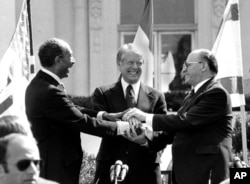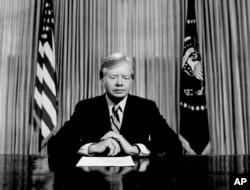Former U.S. President Jimmy Carter has died at the age of 100.
His presidency was marked by rising inflation and unemployment. He helped negotiate a peace agreement between Egypt and Israel. He returned the Panama Canal to the Central American country, recognized mainland China, and signed an arms limitation agreement with the former Soviet Union.
However, in 1979, Iran took U.S. embassy workers hostage in Tehran. The Iran hostage crisis dominated his final years in the White House and contributed to his defeat by Ronald Reagan in the 1980 election.
Carter liked to say the end of his presidency in 1981 was the beginning of a new life. He traveled around the world "fighting disease, building hope, and waging peace," he said.
In 2002, the former president received the Nobel Peace Prize.
The White House released a statement from President Joe Biden and first lady Jill Biden on Sunday, calling Carter “a dear friend.”
Biden also declared January 9, 2025, as a National Day of Mourning in honor of Carter and directed flags at public buildings to be displayed at half-staff for 30 days.
President-elect Donald Trump posted a message on Truth Social: “…He did everything in his power to improve the lives of all Americans. For that, we all owe him a debt of gratitude.”
Early life
Carter was born on October 1, 1924, in the small town of Plains, Georgia.
Carter graduated from the U.S. Naval Academy in 1946 and married Rosalynn Smith in the same year. As an officer in the U.S. Navy, he helped in the development of nuclear submarines. But he returned to his hometown in 1953 to run the family peanut-farming business.
He entered politics in the 1960s as a member of the Democratic Party. Carter served two terms as a Georgia legislator before becoming the state's 76th governor from 1971 to 1975.
The Democratic Party chose Carter as its presidential candidate for the 1976 presidential election. Carter ran against Republican President Gerald Ford who was completing the term of President Richard Nixon. Nixon resigned as a result of the Watergate scandal.
Carter narrowly defeated Ford to become president.
The high point of Carter's presidency came in 1978. He brought Egyptian President Anwar Sadat and Israeli Prime Minister Menachem Begin to Camp David, a presidential vacation home in rural Maryland, to negotiate a peace treaty.
Carter said: "When I became president, there had been four wars between Arabs and Israelis in the previous 25 years…we had success in getting a treaty between Israel and Egypt…not a word of which has ever been violated."
Carter negotiated a treaty turning control of the Panama Canal over to the Panamanian government. He also normalized diplomatic relations with the People's Republic of China, recognizing the communist government in Beijing.
But in 1979, Carter's administration had to turn its attention to Iran. A revolution in that country led by religious clerics ousted the government of the U.S.-supported Shah Mohammad Reza Pahlavi. The U.S. then permitted Pahlavi to receive treatment for cancer in the country.
On November 4, 1979, Iranian militants, unhappy with U.S. action, stormed the U.S. Embassy in Tehran, taking 66 Americans hostage. Thirteen were released weeks later but the hostage crisis extended through the rest of Carter's presidency.
Five months into the crisis, in April 1980, Carter ordered a complex military operation to free the remaining hostages.
The operation was aborted when several aircraft developed problems. Eight U.S. military members and one Iranian civilian died. Walter Mondale, Carter’s vice president, told VOA that that day was the lowest point of their administration.
The failed mission damaged Carter's standing with the American public. It took place seven months before the 1980 presidential election, which Carter lost to Reagan. Carter said, “That was the number one issue that caused me to fail."
Other major events during Carter’s presidency included the invasion of Afghanistan by the former Soviet Union. As a response, Carter ordered a boycott of the 1980 Summer Olympic Games in Moscow.
Life after politics
In 1981, Carter returned to Plains. His plan for a presidential library and museum became the Carter Center in Atlanta, Georgia.
Under his direction, the Carter Center observed more than 80 elections around the world and aimed to negotiate disputes. They included a dispute over nuclear weapons with North Korea in 1994 and a peace agreement between Uganda and Sudan in 1999. The center also aims to support health and fight disease in poor countries.
In one of many interviews with Voice of America, Carter said the greatest parts of his legacy were not the things he did serving the American people as U.S. president or the Nobel Peace Prize.
He said his greatest accomplishment was the eradication of Guinea worm disease. As a result, there were only 13 cases of Guinea worm recorded in 2022.
Carter led an active life until the age of 99, surviving brain cancer in 2015. He last appeared in public during the funeral services for his wife, Rosalynn, in November 2023.
Carter said of his hopes for the country: “I would like to see the United States in the future strive to be the number one champion in the world of peace and human rights and environmental quality, and…treating everyone equal.”
Carter lived longer than any U.S. president, and his 76-year marriage to Rosalynn is the longest of any president and first lady.
He is to be buried on the grounds of his home in Plains, Georgia.
I’m Mario Ritter, Jr.
Kane Farabaugh reported this story for VOA. Mario Ritter, Jr. adapted it for VOA Learning English.
_________________________________________
Words in This Story
dominate –v. to mainly control or to take up all of one’s energy
contribute –v. to help cause something to happen
half-staff –adj. when the U.S. flag is positioned halfway on the flagpole to show a national state of mourning
abort –v. to stop a process or task before it is completed
eradication –n. the process of completely ending or removing something
strive –v. to try to do something with great effort
We want to hear from you.
Our comment policy is here.








Forum